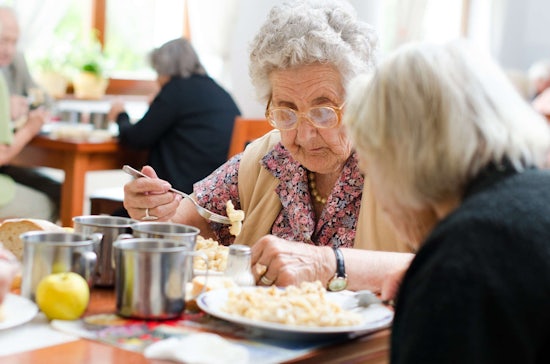Dignity in the dining room
Many people in the community and residents in aged care facilities need assistance to consume meals. This can be one of most important care tasks undertaken by staff in residential aged and community care.

Helping someone consume a meal is an honour and an important part of any meal service.
When a person requires assistance to eat and drink their nutritional health becomes dependent on others. It may be just a meal to you, but that meal is full of nutrients which are vital to maintain that person’s wellbeing.
One of the most effective strategies is to ‘be engaged’ with the person you’re assisting, whether it’s an elderly loved one at home or an aged care resident.
Have a conversation with your client and tell them what is on the plate. When the meal is vitamised/puree, it’s even more important to explain what the person is eating as this texture modification reduces the appearance of what the food looks like.
Cut the meal up in front of the person (once they have seen what it looks like) so they visually see the meal first.
Don’t mix foods together – this should never be done, especially if food services have gone to the effort to actually mould pureed food into food shapes.
Take a seat
Don’t stand over people when feeding; sit on a chair and be at eye level with the person. Have a conversation with them; it may be one sided but talk about things you know about the person like their hobbies or current events like the gardens, weather or sport. If the television is on, talk about what is on the television.
If a person is consistently not eating enough food or drinking enough fluids, this is cause for concern and should be reported to family, supervisors and organisations.
There’s nothing more undignified than having food all over the mouth, with the spoon being used to wipe it up as you would a baby.
When feeding a person who may not open their mouth wide enough, use a smaller fork or spoon – or only scoop a small amount of food onto the utensil.
Co-ordinate the feeding and watch for the cues that the person in care is ready for the next mouthful and don’t rush the meal.
It's an honour…
Helping someone to consume a meal is an honour and an important part of any meal service. Even the smallest assistance of positioning a plate can make a huge difference to the meal for an individual.
One of the most rewarding aspects to ‘dignified’ dining, is enabling people to be independent, ensuring enough food and fluid are consumed and that you’re sharing the ‘meal time’ experience with them.
When you feed or support a person in eating, be present with them at that time. This is an important social stimulation time and we all need company from time to time.
Carers' checklist
- Is the person sitting upright?
- Are they in reach of the meal?
- Are the eating utensils and cups appropriate?
- Be mindful of how much is being consumed at each mouthful
- Have sips of drinks in between to help with fluid intake
- Try not to talk to other people while feeding a resident/loved one
- Ask the person if they would like a cloths protector
- Make sure tables and trays are set






















